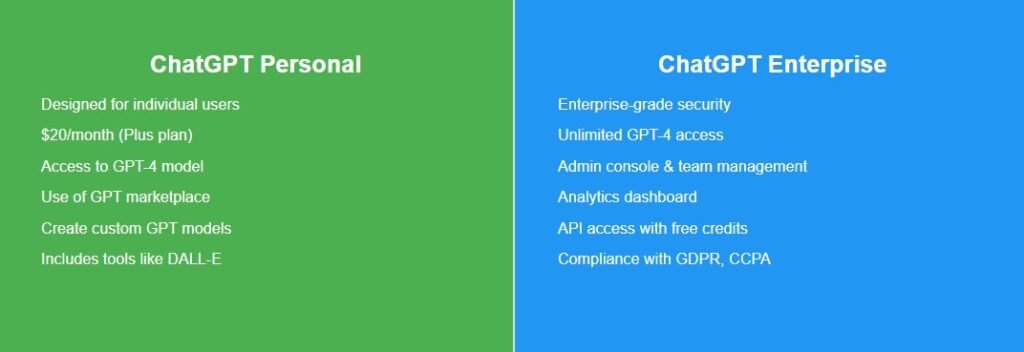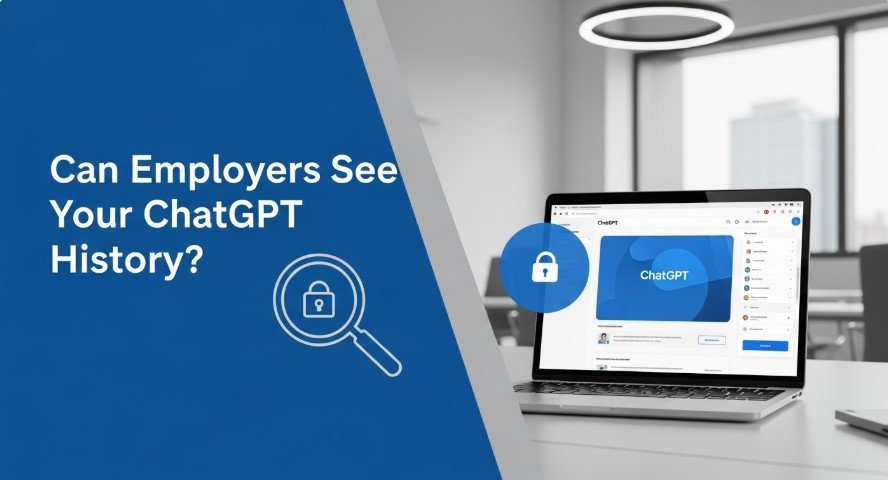Artificial intelligence (AI) tools like ChatGPT are transforming workplaces, aiding tasks from drafting emails to brainstorming ideas. But a key concern for employees is: Can my employer see my ChatGPT history? This article explains how ChatGPT handles privacy, whether employers can monitor your usage, and practical steps to protect your data. We’ll break it down in simple terms to help you stay informed and secure.
Understanding ChatGPT Privacy in the Workplace
Your privacy when using ChatGPT at work depends on whether you’re using a personal or enterprise account and the device or network you’re on.
- Personal Accounts: These are accounts you manage yourself, typically used on personal devices. OpenAI’s privacy policy states that conversations are encrypted, and data isn’t shared without consent. However, using a personal account on a work device or company WiFi may allow employers to track your activity through network monitoring or security software. They likely can’t see your exact chats, but they may know you’re accessing ChatGPT.
- Enterprise Accounts: These are provided by your employer for work tasks. ChatGPT Enterprise or Team accounts include features like single sign-on and the Compliance API, which lets admins view conversation logs and files. This is common in industries like finance or healthcare, where auditing is required.
Key Takeaway: The type of account and device you use determines how much your employer can see. Check your company’s AI usage policies to understand their monitoring practices.

What OpenAI Says About Privacy
OpenAI prioritizes user privacy but has different rules for personal and enterprise users.
- Personal Users: OpenAI encrypts data at rest (AES-256) and in transit (TLS 1.2+). Conversations aren’t used for training unless you opt in. The “Temporary Chat” feature prevents chats from being saved, offering extra privacy. OpenAI’s privacy policy, updated June 27, 2025, states that data isn’t shared with third parties without consent, except for legal requirements.
- Enterprise Users: These accounts offer advanced security, including:
- SOC 2 Type II Compliance: Meets industry security standards.
- Compliance API: Allows admins to access conversation logs and files for auditing.
- Data Residency Options: Stores data in regions like the U.S., Europe, or Asia to comply with local laws.
- Data Processing Addendum (DPA): Supports GDPR and CCPA compliance.
- Business Associate Agreement (BAA): Available for HIPAA compliance in healthcare.
OpenAI’s enterprise privacy page (https://openai.com/enterprise-privacy/) notes that workspace admins can access conversation logs, but only authorized OpenAI staff can view data for specific reasons, like resolving issues or meeting legal obligations.
Key Takeaway: Personal accounts offer more privacy, but enterprise accounts give employers access to logs through tools like the Compliance API.
How Employers Might Monitor ChatGPT Usage
Employers can monitor ChatGPT usage, especially with enterprise accounts or on work devices. Here’s how:
- Enterprise Accounts: The Compliance API lets admins view conversations, files, and metadata. This is used in regulated industries for compliance with laws like GDPR or HIPAA. Tools like Smarsh or Relativity integrate with the API to store and review data. A July 18, 2024, OpenAI update highlighted this feature for industries like finance.
- Work Devices and Networks: Using a personal account on a work laptop or company WiFi allows employers to track activity through:
- Network Monitoring: Logs web traffic, showing visits to ChatGPT’s site but not chat content.
- Endpoint Security: Software like keyloggers or screen recorders could capture activity, though this is rare and invasive.
- Real-World Cases: A 2023 Reddit post described an employee using ChatGPT for a side business on a work laptop, raising concerns about employer access. Another case on Fishbowl reported a data breach detected when company data was entered into ChatGPT, showing monitoring capabilities.
Key Takeaway: Enterprise accounts enable direct access to chats, while work devices increase monitoring risks through network or security tools.
How to Protect Your Privacy
You can take steps to keep your ChatGPT usage private at work:
- Use Personal Devices: Access ChatGPT on your personal phone or laptop to avoid employer monitoring.
- Avoid Company Networks: Use mobile data instead of company WiFi to reduce network tracking.
- Enable Temporary Chats: This feature prevents conversations from being saved, adding privacy.
- Check Company Policies: Review your organization’s rules on AI tools and data monitoring.
- Avoid Sensitive Data: Don’t input confidential or personal information. A 2023 Cyberhaven report found 4.7% of employees paste confidential data into ChatGPT, risking leaks.
Important Note: No method ensures complete privacy. Consult your IT or HR team to understand workplace monitoring practices.
Legal and Ethical Considerations
Using ChatGPT at work involves legal and ethical issues.
- Legal: Employers must follow data protection laws like GDPR or CCPA. OpenAI supports compliance through DPAs and BAAs. Employees should avoid inputting personal or client data to prevent violations. A 2024 article noted GDPR compliance requires clear data processing agreements.
- Ethical: Monitoring AI usage can protect company data but may reduce trust if not transparent. A 2025 Washington Post article highlighted how excessive surveillance can harm morale. Employers should communicate monitoring policies clearly.
Best Practice: Employees should review AI policies, and employers should balance monitoring with transparency.
Frequently Asked Questions (FAQs)
- Can my employer see my personal ChatGPT account on a work device?
They can’t access your conversations directly, but network monitoring may show you visited ChatGPT. Use personal devices for privacy. - Is my data safe with ChatGPT?
OpenAI uses encryption, but risks like data breaches exist. Avoid sharing sensitive information. - Can employers track what I input into ChatGPT?
With enterprise accounts, yes, via the Compliance API. For personal accounts on personal devices, it’s unlikely unless monitoring tools are used. - What if I’m concerned about privacy?
Use personal devices, avoid company networks, enable Temporary Chats, and review workplace policies.
Conclusion
Your employer’s ability to see your ChatGPT history depends on whether you use an enterprise or personal account and the device or network you’re on. Enterprise accounts allow access through tools like the Compliance API, while personal accounts on work devices may be tracked via network monitoring. To stay private, use personal devices, avoid company WiFi, and enable Temporary Chats. Both employees and employers should communicate clearly about AI policies to maintain trust and compliance.
Explore more:
